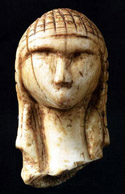Anthropology, Department of

Department of Anthropology: Faculty Publications
Document Type
Article
Date of this Version
2012
Citation
Theory in Social and Cultural Anthropology: An Encyclopedia, edited by R.J. McGee & R.L. Warms. Thousand Oaks, California, USA: Sage, 2012, pages 72-75.
Abstract
Binford challenged anthropologists and archaeologists to expand the scope of their research, to develop more rigorous methodologies for data collection and analysis, and to think more critically. Science is a marathon without a finish line. Our understanding of past and present human behavior and cultural systems does not come easily. Social scientists can produce reliable knowledge by means of an iterative process that involves generating, testing, and refining (or rejecting) explanatory models. These models are, then, combined to construct scientific theories. The robust consequences of these theories are then continually scrutinized and evaluated. Binford continually made use of the complex web of what we know to define better what we do not understand about the external world. He demonstrated how social scientists should make use of models and theories to identify productive anthropological and archaeological research questions, to construct causal arguments, and to evaluate those arguments by means of rigorous, structured observation and analysis. And he reminded us later in his life that theory building is not for the timid or faint of heart.
Included in
Archaeological Anthropology Commons, Biological and Physical Anthropology Commons, Higher Education Commons, Social and Cultural Anthropology Commons


Comments
Copyright 2012, Sage. Used by permission.